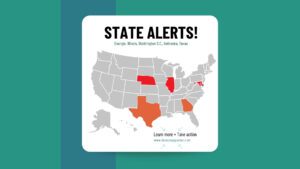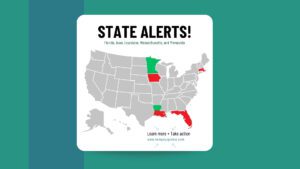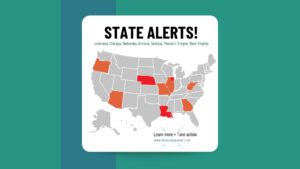INDUSTRY UPDATES
May 05, 2023
Multi-State Update On Hemp Legislation and Regulations Post-Fly In

Check out the latest legislative updates across the states and take action today!
While Hemp Supporters from across the country were in D.C. last week for the Roundtable’s annual fly-in, there have been key developments for bills we’ve been following in the states.
Colorado
As we’ve shared throughout the year, we’ve been hard at work with our friends in Colorado to ensure that hemp products are regulated fairly. The work started last year and continued in earnest earlier this year—when a Colorado Task Force issued final recommendations for the regulation of intoxicating hemp and THC products.
Together under Governor Jared Polis’s leadership, the Task Force developed a compromise that, albeit imperfect, would have brought Colorado closer to regulating hemp products fairly and appropriately. A bill was drafted that largely put the recommendations into law: SB 23-271. Unfortunately, lobbyists from some parts of the marijuana industry and selected hemp interests successfully secured amendments to the bill which varied from the Task Force’s recommendations.
Here’s what to know about where the bill stands:
- The Task Force recommended a 2.5mg THC limit per serving for hemp products, but SB 23-271 lowers that limit to the arbitrary amount of 1.75mg.
- The Task Force recommended a safe harbor provision that would allow intoxicating and potentially intoxicating products like delta-8 and HHC to be manufactured for export to states where the products are legal. SB 23-271 includes a safe harbor provision, but it requires that safe harbor products be manufactured in a facility that is used exclusively to manufacture those products and it prohibits marketing safe harbor products as containing THC.
- The Task Force recommended not allowing the production of intoxicating and potentially intoxicating products in Colorado, but SB 23-271 would also prohibit them from being distributed or sold (except for export to other states).
- The Task Force did not recommend any age limits, yet SB 23-271 prohibits selling hemp products with a CBD-to-THC ratio of less than 20:1 to a person under 21 years old (except for cosmetics).
- The Task Force did not recommend any container limits, but SB 23-271 limits a hemp product with a CBD-to-THC ratio of less than 20:1 to five servings per container.
- Without any recommendation from the Task Force, SB 23-271 limits tinctures to four fluid ounces per container and requires them to have at least 25% non-denatured alcohol or base of glycerin, plant-based oil, or concentrated syrup.
- The Task Force recommended an approval process for the production and sale of synthetic cannabinoids, but SB 23-271 prohibits synthetic cannabinoids in all aspects.
The bill has passed the Senate and appears on track to pass the House before the session ends this weekend, perhaps as soon as today.
Hemp stakeholders are working furiously to make improvements to the bill to bring it closer to the version that mirrored the Task Force’s approach. However, the consensus among those on the ground is that a weaker bill is better than no bill at all. There are important regulatory protections in the bill, and currently, hemp businesses are being raided by local and state law enforcement. Safe harbor provisions still in the bill should protect against these challenges. The hemp industry is resolved to try to improve its treatment in the regulatory process.
Florida
There’s much better news in the Sunshine State. SB 1676 passed both chambers and is being sent to the Governor. Hemp supporters were successful in getting many problematic parts of the bill removed, such as redefinition of the terms “hemp,” “synthetic,” and “total THC”; dosage limits; and the ban against manufacturing and selling alternative products by the hemp industry. The approach is much along the lines of Kentucky’s model that we have been advocating: it creates label and container requirements for hemp extracts (including for poison prevention), limits all ingestible and inhalable hemp extract products to persons 21 or older, and prohibits marketing ingestible hemp extracts in a way that is attractive to children.
Kentucky
Speaking of the Bluegrass State on Derby Week, following the enactment of HB 544, the Department for Public Health must issue regulations for intoxicating cannabinoids. Our team recently met with Commissioner Steven Stack to discuss what the industry would like to see in the new regulation. The meeting ended positively, with the sense that we will see a draft regulation that will be along the lines what we have proposed. In the meeting, our General Counsel Jonathan Miller received assurances that the new regulation would apply only to intoxicating cannabinoids and products, and non-intoxicating CBD and hemp extract products could still be sold at retail without the adult-use restrictions that will apply to intoxicating products.
Delaware
HB 1 was enacted without the Governor’s signature. The bill, which primarily relates to personal marijuana use, amends the definition of marijuana to exclude hemp. This is an important win for the industry.
Hawaii
A conference committee agreed to an amended version of SB 516. The committee’s version passed the Senate, is expected to pass the House, and then will be sent to the Governor. In part, the bill requires hemp products to state on their labels the percentage of Hawaii-grown and Hawaii-processed hemp. A product containing hemp not grown and processed in Hawaii must identify the country or state of origin and percentage of hemp grown or processed outside Hawaii.
Minnesota
Good news in the Gopher State: the House and Senate passed different versions of HF 100. The bill limits “lower potency edible products” servings to 5mg of delta-9 THC, 25mg of CBD, 25mg of CBG, and 0.5mg of all other cannabinoids; requires a retail license to sell the products; requires that the products be stored behind a counter; restricts the products and other food-type cannabinoid products to persons 21 or older; and prohibits products that appear to be a lollipop or ice cream, that are modeled after products marketed to children, that contain an artificial cannabinoid, or that are made by applying a cannabinoid to a finished food product that does not contain cannabinoids (including candy or snack food).
Although not perfect, the provisions are favorable to the industry. The competing versions of the bill are now headed to the Conference Committee. If the Conference Committee reaches consensus, the bill must pass both chambers and then be signed by the Governor. We expect the Conference Committee will produce a compromise version and that full cannabis legalization will signed into law sometime in May.
Tennessee
A qualified win in the Volunteer State: SB 378 is on its way to the Governor, who is expected to sign it. The bill provides a Kentucky-like regulatory regime for all hemp-derived cannabinoids. However, unlike Kentucky, there is no distinction between intoxicating and non-intoxicating products—all cannabinoid products are legal, but limited to persons 21 or older. Moreover, cannabinoid products must be kept behind the counter at retail, and manufacturers and sellers, including retailers, need to obtain a license to sell them.
Texas
Fingers are crossed for a positive session in the Lone Star State. HB 2818—the “clean up” bill to make Texas’s hemp program federally complaint—passed the House and has been received in the Senate. HB 4918, which repeals the ban on manufacturing smokable hemp, was reported favorably out of a House committee nearly three weeks ago, but appears stalled. Likewise, SB 264, which would ban synthetically derived cannabinoids, is stuck in committee. The legislature adjourns May 29.
Washington
Frustration in the Evergreen State: SB 5367 passed with numerous amendments and is sitting on Governor Inslee’s desk. We expect the Governor to sign the bill or allow it to become law without his signature. Legislators and public safety organizations differ on the scope of the bill’s intent. The final version limits hemp consumable products to those that do not have “any detectable amount of THC.” Full spectrum or any hemp products intended for human oral consumption with detectable THC would be considered a “cannabis product” that cannot be sold anywhere in WA state or shipped to consumers. Natural broad spectrum and isolate hemp consumables without “any detectable amount of THC” would be allowed to be sold. Synthetic forms of THC are prohibited to be sold or manufactured anywhere in the state.
Despite outnumbering marijuana interest groups, hemp stakeholders were ignored during the rushed legislative process, as were the Washington Task Force’s recommendations, peer-reviewed data, and an independent literature review. In negotiating the bill, the Liquor Cannabis Board started at 1mg/3mg limits, but the limits were amended down to 0.5mg/1.5mg. And then the Senate unanimously passed a floor amendment categorizing hemp products with “any amount of THC” as adult-use cannabis products that could only be sold in adult-use markets. Thankfully, the House passed the current version, though there’s work still to be done. We are hearing that there will be a hemp consumables bill next year that aligns with the Task Force’s recommendations, and several legislators and the Governor’s office expressed their support for that approach.
Visit our State Action Center to see active campaigns across the country!
Check out the latest hemp and CBD updates from across the states!
- Updates in Georgia, Illinois, Washington D.C., Nebraska & TexasCheck out the latest legislative updates across the states and take action today! Georgia Georgia SB 494 is on the Governor’s desk (see previous alert), and while it’s not perfect, it’s far …
- Updates in Five States – Florida, Iowa, Louisiana, Massachusetts & MinnesotaCheck out the latest legislative updates across the states and take action today! Florida Florida SB 1698 would ban delta-8 THC and similar products and set total THC limits of 5mg/serving and …
- The War on Hemp in 3 More States: Louisiana, Illinois, and NebraskaCheck out the latest legislative updates across the states and take action today! Louisiana SB 237 would be a giant step backwards in Louisiana. The bill limits consumable hemp products to 0.0% …




